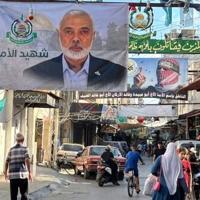Mourners gathered at a Qatari mosque on Friday to bid farewell to Hamas leader Ismail Haniyeh following his death in Tehran, an incident attributed to Israel which heightened concerns of a broader conflict.
Haniyeh, the political leader of the Palestinian armed group, played a crucial role in mediating talks to end almost 10 months of conflict between his Islamist organization and Israel in Gaza.
His death sparked calls for retaliation and raised doubts about the future of such peace negotiations.
Haniyeh, who resided in Doha along with other Hamas political members, will be laid to rest in Lusail, north of the Qatari capital, after funeral prayers at Imam Muhammad bin Abdul Wahhab mosque, the largest in the Gulf state.
His killing is part of several incidents since April that have escalated regional tensions amid the Gaza conflict, involving Iran-backed militant groups in Syria, Lebanon, Iraq, and Yemen.
Turkey and Pakistan declared a day of mourning on Friday to honor Haniyeh, while Hamas called for a “day of furious rage”.
Prior to the prayers, hundreds of mourners had already arrived at the Doha mosque.
Many wore scarves with the Palestinian flag or traditional keffiyeh patterns for the ceremony held under strict security.
Doha traffic police and Qatar’s internal security forces monitored all entrances, with police positioned along the highway surrounding the mosque grounds.
– Notable Assassinations –
Haniyeh and a bodyguard were killed in a pre-dawn attack on their residence in Tehran early Wednesday, confirmed Iran’s Revolutionary Guards. Haniyeh had traveled to Iran for the swearing-in of President Masoud Pezeshkian on Tuesday.
Israel, accused by Hamas, Iran, and others of the attack, has not directly responded to the allegations.
A source close to Lebanon’s Hezbollah movement stated that Iranian officials met in Tehran on Wednesday to discuss next steps with representatives of the “Axis of Resistance”, a group of Tehran-aligned organizations in the Middle East including Hezbollah and Hamas.
“Two scenarios were discussed: a joint response from Iran and its allies or a gradual response from each party,” stated the source, who was briefed on the meeting and requested anonymity.
During the Gaza conflict, Hezbollah and Israeli forces have engaged in frequent exchanges of fire, as seen on Thursday.
The killing of the Hamas leader occurred shortly after Israel struck a southern suburb of Beirut, resulting in the death of Fuad Shukr, the military commander of Hezbollah, a group that supports Hamas.
Haniyeh’s deputy, Saleh al-Aruri, had previously been killed in south Beirut earlier this year in an attack reportedly carried out by Israel, according to a US defense official.
Israel’s military confirmed that an airstrike in July killed the Hamas military chief, Mohammed Deif, in Gaza.
“Israel has dealt severe blows to all our enemies,” stated Prime Minister Benjamin Netanyahu.
In Tehran on Thursday, thousands of mourners paid respects during a public funeral for Haniyeh. Iran’s supreme leader, Ayatollah Ali Khamenei, led the prayers and had previously threatened severe consequences for the killing.
Haniyeh’s coffin was then transported to Doha.
Iran’s First Vice President Mohammad Reza Aref traveled from Tehran to attend the ceremonies in Doha, as announced by the Iranian government on Thursday.
Netanyahu vowed to eliminate Hamas in retaliation for the October 7 attack on Israel, which sparked the Gaza conflict.
That attack resulted in the deaths of 1,197 people, mostly civilians, according to an AFP tally based on official Israeli data.
The retaliatory actions by Israel against Hamas have resulted in at least 39,480 fatalities in Gaza, according to the Hamas-run health ministry, without specifying civilian or militant casualties.
– Ceasefire Uncertain –
The New York Times, citing Middle Eastern officials, reported that Haniyeh was killed by an explosive device planted several weeks ago in a Tehran guesthouse.
When asked about the report, Israeli military spokesman Daniel Hagari stated that “there was no other Israeli aerial attack… in all the Middle East” around the time of Shukr’s killing in Lebanon.
Hugh Lovatt, an analyst at the European Council on Foreign Relations, mentioned that Haniyeh’s assassination “will at the very least mean that a ceasefire agreement with Israel is now completely off the table”.
Despite this, the international community urged calm and a focus on achieving a ceasefire in Gaza, a goal Haniyeh accused Israel of obstructing.
US President Joe Biden expressed deep concerns about escalating tensions in the region and noted that Haniyeh’s killing had exacerbated the situation.
The White House reported that Biden spoke with Netanyahu by phone on Thursday, assuring to protect Israel’s security against threats from Iran.
“We have the basis for a ceasefire. He should act on it and they should act on it now,” Biden told reporters after the conversation.
In Israel, hundreds of Israelis marched in Tel Aviv demanding the government reach an agreement to bring back the remaining hostages.
Hezbollah leader Hassan Nasrallah, speaking at Shukr’s funeral, warned Israel and its supporters to expect a response to the dual assassinations.
“You have crossed red lines without knowing it,” Nasrallah addressed Israel.
Israel justified Shukr’s assassination as a response to rocket fire that killed 12 young individuals in the Golan Heights last week.
csp-it/hkb





